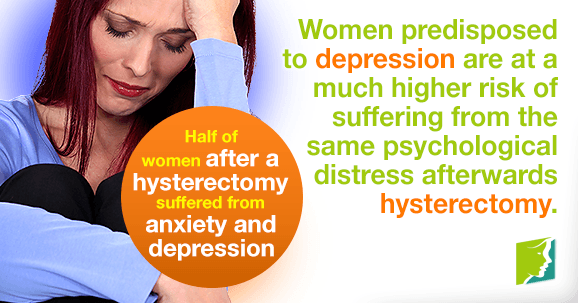There are many reasons a woman might decide that a hysterectomy is right for her. Some of these reasons include prolonged vaginal bleeding, intense pelvic pain, or even cancer. However, as with any surgery, there are large and numerous risks involved. One of the prevailing professional concerns in recent years has been the incidence of depression after a hysterectomy, underscoring the argument that a medically successful operation does not necessarily equate holistic success. If you have had or are considering a hysterectomy, it's important to educate yourself on the possible emotional effects.
About Depression and Hysterectomies
Depressive symptoms are common in women when a hysterectomy is medically necessary, often due to the extreme nature of the conditions causing this necessity; therefore, in many cases, the operation is supposed to treat both the underlying reasons for the surgery and the emotional side effects they cause.
However, it has been shown that women who are predisposed to depression, anxiety, or hostility before an operation are at a much higher risk of suffering from the same psychological distress afterwards. One study performed showed that half of the women who underwent a hysterectomy suffered from anxiety-depressive disorders as a direct result of the operation, and a quarter required help from specialists.
Risk Factors for Depression After a Hysterectomy
There are several definitive factors involved that increases a woman's chances of suffering from post-hysterectomy major depressive disorder:
- Previous emotional problems
- Poor body image
- Decreased sexual functioning (post-op)
- High levels of stress
- Deficient psychological preparation for or knowledge about operation
- Absence of closest people or their support before or after surgery
- Having never given birth
- Lack of psychological support post-op
- Removal of ovaries during or ovarian failure after surgery
In summary, the direction post-operation takes is most often affected by two things: a woman's psychological state and her quality of life. The better condition of both of these things, the greater her chances of a speedy and healthy recovery.
How to Prevent or Treat Depression After a Hysterectomy
Probably the most far-reaching and effective prevention of depression after a hysterectomy is having the proper psychological support going into the surgery and post-op. Hysterectomies are a stressful event in a woman's life, and she should not only be well-informed and calm before the procedure, but she should also have an outlet for candid conversation and questions afterwards - whether or not she is prone to emotional instabilities. The presence, knowledge, and support of a parent, partner, or other important person can also fall into this category, and its importance in the face of such an intimate procedure shouldn't be underestimated.
Other post-op treatments include taking estrogen and testosterone replacement therapy. Sometimes, hysterectomies result in ovarian failure, or perhaps the surgery included the removal of the ovaries (oophorectomy). In either case, helping the body balance with the reintroduction of the ovaries' natural hormones has been shown to provide relief from depression. Talk therapy is another helpful option.
No matter who you are or your background, a hysterectomy is a major procedure that can have a lasting impact on a woman's life. Armed with the proper knowledge and tools, you can ensure that the impact is a positive and healthy one.
Sources
- Ewalds-Kvist, S.B. et al. (2005). Depression, anxiety, hostility and hysterectomy. Journal of Psychosomatic Obstetrics and Gynaecology, 26(3), 193-204. Retrieved from http://www.ncbi.nlm.nih.gov/pubmed/16295517
- Jawor, M. et al. (2001). Anxiety-depressive disorder in women after hysterectomy. Own study. Psychiatria Polska, 35(5), 771-780. Retrieved from http://www.ncbi.nlm.nih.gov/pubmed/11842609
- Khastgir, G. ' Studd, J. (1998). Hysterectomy, ovarian failure, and depression. Menopause, 5(2), 113-122. Retrieved from http://www.ncbi.nlm.nih.gov/pubmed/9689206
- Yen, J.Y. et al. (2008). Risk factors for major depressive disorder and the psychological impact of hysterectomy: a prospective investigation. Psychosomatics, 49(2), 137-142. Retrieved from http://www.ncbi.nlm.nih.gov/pubmed/18354067




